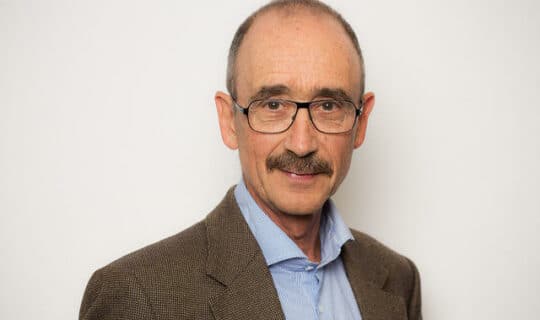
Professor Denis Duboule
EPFL, Lausanne, Switzerland
- 17:00
- Online, https://monash.zoom.us/j/84154420384?pwd=NGd4Smg3Nm1BSGpUTDBwYjEzUmU0QT09
- A/Prof Edwina McGlinn
The Hox timer in embryos and pseudo-embryos
Abstract
During vertebrate development, clustered Hox genes are activated in a precise time-sequence, leading to expression patterns necessary to properly establish the body plan. The mechanism underlying this in cis timing phenomenon (The Hox timer) has remained elusive ever since its initial observation in 1989, due to the difficulty to approach it using the small and complex early gastrulating mouse embryos. I will introduce this topic and discuss an alternative possibility, which is to use pseudo-embryos produced out of ES cells (referred to as gastruloids) to address this question. Using such gastruloids, I will describe some of our unpublished attempts to solve this question and propose a model for the Hox timer.
Bio
Denis Duboule, Swiss and French national, studied biology at the university of Geneva where he obtained a PhD in mammalian embryology in 1984. After being a postdoc and a group leader in the medical faculty in Strasbourg (France) and a PI at the European Laboratory for Molecular Biology (EMBL, Germany), he was appointed full professor at the university of Geneva in 1993 where he chaired the department of Genetics and Evolution from 1997 to 2017. From 2001 to 2013, he chaired the Swiss national center of research ‘Frontiers in Genetics’. In 2006, he was appointed as a professor at the Federal Institute of Technology (EPFL) in Lausanne and was elected Professor at the Collège de France in Paris in 2017. He is member of the Academia Europea as well as of several academies in Switzerland, France and the Netherland. He is a foreign member of the Royal Society (UK) and of the National Academy of Sciences USA. He has received various scientific prizes and awards, amongst which the Marcel Benoist Prize, the Louis-Jeantet prize for medicine in 1998 or the international INSERM prize in 2010 (see https://en.wikipedia.org/wiki/Denis_Duboule).Our research activities are in the fields of embryology, genetics and developmental genomics of mammals, in an evolutionary context. Our laboratory has been closely associated with structural and functional studies of mammalian Hox genes by using mouse molecular genetic approaches and to the understanding of their regulatory mechanisms. Currently, we are using CRISPR/cas9 approaches to engineer mutant chromosomes either in mouse embryos or in ES-cells derived pseudo-embryos in culture, to try to understand the regulatory mechanism underlying the precise developmental timing in the activation of this gene family during gastrulation.
Click here to download the flyer
